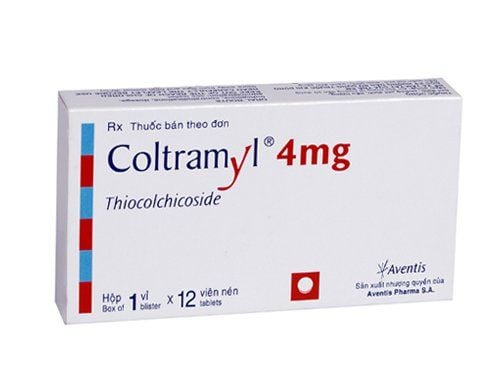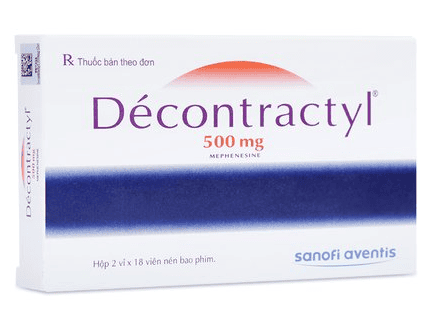This is an automatically translated article.
Kesera 750mg contains the main active ingredient Methocarbamol. The drug has a muscle relaxant effect, helping to treat symptoms such as acute low back pain, fractures, and dislocations. Use medicines as prescribed by your doctor or pharmacist to ensure safety.
1. What is Kesera?
Kesera tab 750mg contains the main active ingredient Methocarbamol. The drug exerts a muscle relaxant effect through selective inhibition of the central nervous system, especially the interneurons. The drug also has the ability to calm the central nervous system, inhibit muscle spasms, relieve acute pain. The drug acts quickly, after about 30 minutes of use.
At usual therapeutic doses, Methocarbamol does not reduce contractility, normal physiological reflexes of muscles or affect motor neurons.
2. Indications and usage of Kesera 750 mg
Kesera 750 mg is indicated for the relief of painful symptoms of muscle tension, such as acute low back pain, fractures, dislocations, muscle spasms due to nerve irritation or trauma, after surgery. Kesera 750mg is administered orally at the following specific doses:The recommended dose for adult patients is 1500mg of methocarbamol x 3 times a day. At the start of treatment, the recommended dose is 1500mg of Methocarbamol 4 times a day. In severe cases, patients can take up to 7500mg of Methocarbamol per day. The duration of treatment depends on the symptoms but should not exceed 30 days; For children: The safety and effectiveness of Methocarbamol have not been established; For elderly patients: Half the maximum dose or less can be used to meet the therapeutic needs; Patients with hepatic impairment: For patients with chronic liver disease, the half-life of the drug may be longer than usual. Therefore, it may be necessary to consider increasing the interval between doses. Patients should note that the above dosage is for reference only. The specific dose depends on the condition and severity of the disease. Therefore, patients should contact their medical staff to get the right dose for their medical condition.
3. What to do in case of overdose?
Currently, there is not much information about Kesera overdose. Overdose usually occurs in case of concomitant use with alcohol or other central nervous system depressants.
Patients with an overdose of Kesera may have symptoms including vomiting and nausea, somnolence, hypotension, convulsions, and coma. Data have shown 3 deaths when patients used Methocarbamol after drinking large amounts of alcohol (2 cases) or using opiates (1 case). To manage drug overdose, the doctor may prescribe gastric lavage, symptomatic treatment, and circulatory and respiratory monitoring.
4. What are the side effects of the drug?
Kesera medicine can cause some of the following undesirable effects:
Cardiovascular: Bradycardia, syncope, hypotension, thrombophlebitis; Dermatology: Itching, rash, urticaria; Gastrointestinal: Indigestion, nausea, vomiting; Hematology: Leukopenia ; Liver: Cholestatic jaundice, jaundice; Hypersensitivity: Anaphylaxis, angioedema; Local: local exfoliation, pain at injection site; Nervous system: Amnesia, confusion, headache, insomnia, sedation, convulsions, dizziness; Ophthalmology: Blurred vision, conjunctivitis, diplopia, nystagmus; Respiratory: Nasal congestion; Other: Fever, broken bones.
5. What is the note when using Kesera?
Contraindicated in case the patient is hypersensitive to Methocarbamol or any component of the drug; the patient is in a pre-coma, coma, brain injury or central nervous system disorder, myasthenia gravis and epilepsy; Methocarbamol should be used with caution in patients with impaired liver or kidney function; Drinking alcohol during treatment with may increase the effect of the drug; Ability to drive and use machines: Methocarbamol may cause dizziness, headache, and drowsiness, especially if taken with other drugs that can cause drowsiness. Therefore, patients should be careful when driving or using machinery while taking the drug; Pregnancy: Reproduction studies in animals have not established an answer to the safety of Methocarbamol during pregnancy. The manufacturer notes that potential fetal abnormalities for humans may not be known. Therefore, Methocarbamol should not be used by pregnant women. Lactation: It is not known whether Methocarbamol passes into breast milk. The manufacturer recommends that Methocarbamol should not be used by women who are breast-feeding. Drug Interactions: Concomitant use of Methocarbamol with other drugs may affect the effect or increase the toxicity of the drug. For example, when taking Methocarbamol with drugs acting on the central nervous system such as Opioids, Barbiturates can increase the effects of all drugs. In addition, Methocarbamol may potentiate the effects of anticholinergic drugs (eg Atropin). In summary, Kesera helps relieve the symptoms of pain caused by muscle tension. There are not many data on the use of the drug in pregnant and lactating women. Therefore, it is best not to take the drug during pregnancy and lactation.
Please dial HOTLINE for more information or register for an appointment HERE. Download MyVinmec app to make appointments faster and to manage your bookings easily.













